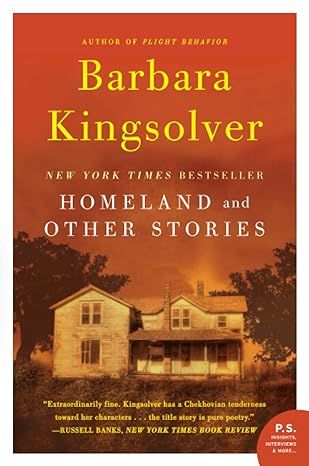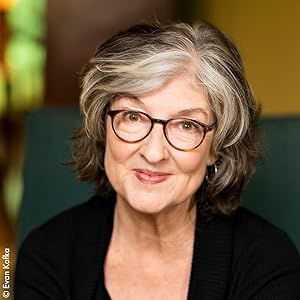Homeland: And Other Stories
4.2
-
691 ratings
“Extraordinarily fine. Kingsolver has a Chekhovian tenderness toward her characters. . . . The title story is pure poetry.” —Russell Banks, New York Times Book Review
With the same wit and sensitivity that have come to characterize her highly praised and beloved novels, acclaimed author Barbara Kingsolver gives us a rich and emotionally resonant collection of twelve stories. Spreading her memorable characters over landscapes ranging from Northern California to the hills of eastern Kentucky and the Caribbean island of St. Lucia, Kingsolver tells stories of hope, momentary joy, and powerful endurance. In every setting, Kingsolver's distinctive voice— at times comic, but often heartrending—rings true as she explores the twin themes of family ties and the life choices one must ultimately make alone.
Homeland and Other Stories creates a world of love and possibility that readers will want to take as their own.
This edition includes a P.S. section with additional insights from the author, background material, suggestions for further reading, and more.
Kindle
$13.99
Available instantly
Audiobook
$0.00
with membership trial
Hardcover
$5.24
Paperback
$14.41
Ships from
Amazon.com
Payment
Secure transaction
ISBN-10
006227774X
ISBN-13
978-0062277749
Print length
272 pages
Language
English
Publisher
Harper Perennial
Publication date
May 06, 2013
Dimensions
5.31 x 0.61 x 8 inches
Item weight
7.2 ounces
Product details
ASIN :
B000QUCO3U
File size :
4423 KB
Text-to-speech :
Enabled
Screen reader :
Supported
Enhanced typesetting :
Enabled
X-Ray :
Not Enabled
Word wise :
Enabled
Editorial reviews
"A dazzling array of short stories . . . Kingsolver's knowledge of human nature, and especially domestic relationships, is breathtaking." — Publishers Weekly
“Read Homeland and Other Stories and you will feel glad to be alive. You are delighted by a gifted storyteller. You are strengthened and healed by the toughness and tenderness she discerns in humanity’s daily rounds.” — Newsday
“Kingsolver’s humanity sounds the clearest note.telling us about characters in the middle of their days, who live as we really do, from one small incident of awareness to the next.” — Los Angeles Times
"Extraordiarily fine . . . Kingsolver has a Chekhovian tenderness toward her characters . . . The title story is pure poetry." — Russell Banks, New York Times Book Review
“Kingsolver understands in an uncanny way the significance of the ordinary, the fleeting moment that may become lost or become catharsis. She writes with refreshing clarity, humor and honesty.” — Detroit Free Press
“Kingsolver is an extraordinary storyteller.” — Chicago Tribune
"Delightful." — New York Woman
Sample
Homeland
I
MY GREAT-GRANDMOTHER belonged to the Bird Clan. Hers was one of the fugitive bands of Cherokee who resisted capture in the year that General Winfield Scott was in charge of prodding the forest people from their beds and removing them westward. Those few who escaped his notice moved like wildcat families through the Carolina mountains, leaving the ferns unbroken where they passed, eating wild grapes and chestnuts, drinking when they found streams. The ones who could not travel, the aged and the infirm and the very young, were hidden in deep cane thickets where they would remain undiscovered until they were bones. When the people’s hearts could not bear any more, they laid their deerskin packs on the ground and settled again.
General Scott had moved on to other endeavors by this time, and he allowed them to thrive or perish as they would. They built clay houses with thin, bent poles for spines, and in autumn they went down to the streams where the sycamore trees had let their year’s work fall, the water steeped brown as leaf tea, and the people cleansed themselves of the sins of the scattered-bone time. They called their refugee years The Time When We Were Not, and they were forgiven, because they had carried the truth of themselves in a sheltered place inside the flesh, exactly the way a fruit that has gone soft still carries inside itself the clean, hard stone of its future.
II
My name is Gloria St. Clair, but like most people I’ve been called many things. My maiden name was Murray. My grown children have at one time or another hailed me by nearly anything pronounceable. When I was a child myself, my great-grandmother called me by the odd name of Waterbug. I asked her many times why this was, until she said once, to quiet me, “I’ll tell you that story.”
We were on the front-porch swing, in summer, in darkness. I waited while she drew tobacco smoke in and out of her mouth, but she said nothing. “Well,” I said.
Moonlight caught the fronts of her steel-framed spectacles and she looked at me from her invisible place in the dark. “I said I’d tell you that story. I didn’t say I would tell it right now.”
We lived in Morning Glory, a coal town hacked with sharp blades out of a forest that threatened always to take it back. The hickories encroached on the town, springing up unbidden in the middle of dog pens and front yards and the cemetery. The creeping vines for which the town was named drew themselves along wire fences and up the sides of houses with the persistence of the displaced. I have heard it said that if a man stood still in Morning Glory, he would be tied down by vines and not found until first frost. Even the earth underneath us sometimes moved to repossess its losses: the long, deep shafts that men opened to rob the coal veins would close themselves up again, as quietly as flesh wounds.
My great-grandmother lived with us for her last two years. When she came to us we were instructed to call her Great-Grandmother, but that proved impossible and so we called her Great Mam. My knowledge of her life follows an oddly obscured pattern, like a mountain road where much of the scenery is blocked by high laurel bushes, not because they were planted there, but because no one thought to cut them down.
I know that her maternal lineage was distinguished. Her mother’s mother’s father was said to have gone to England, where he dined with King George and contracted smallpox. When he returned home his family plunged him into an icy stream, which was the curative custom, and he died. Also, her mother was one of the Bird Clan’s Beloved Women. When I asked what made her a Beloved Woman, Great Mam said that it was because she kept track of things.
But of Great Mam’s own life, before she came to us, I know only a little. She rarely spoke of personal things, favoring instead the legendary and the historic, and so what I did discover came from my mother, who exercised over all matters a form of reverse censorship: she spoke loudly and often of events of which she disapproved, and rarely of those that might have been ordinary or redemptive. She told us, for instance, that Great-Grandfather Murray brought Great Mam from her tribal home in the Hiwassee Valley to live in Kentucky, without Christian sanction, as his common-law wife. According to Mother, he accomplished all of this on a stolen horse. From that time forward Great Mam went by the name of Ruth.
It was my mother’s opinion that Great-Grandfather Murray was unfit for respectable work. He died after taking up the honest vocation of coal mining, which also killed their four sons, all on the same day, in a collapsed shaft. Their daughter perished of fever after producing a single illegitimate boy, who turned out to be my father, John Murray. Great Mam was thus returned to refugee ways, raising her grandson alone in hard circumstances, moving from place to place where she could find the odd bit of work. She was quite remarkably old when she came to us.
I know, also, that her true name was Green Leaf, although there is no earthly record of this. The gravesite is marked Ruth. Mother felt we ought to bury her under her Christian name in the hope that God in His infinite mercy would forget about the heathen marriage and stolen horses and call her home. It is likely, however, that He might have passed over the headstone altogether in his search for her, since virtually all the information written there is counterfeit. We even had to invent a date and year of birth for her since these things were unknown. This, especially, was unthinkable to my brothers and me. But we were children, of course, and believed our own birthdays began and ended the calendar.
To look at her, you would not have thought her an Indian. She wore blue and lavender flowered dresses with hand-tatted collars, and brown lace-up shoes with sturdy high heels, and she smoked a regular pipe. She was tall, with bowed calves and a faintly bent-forward posture, spine straight and elbows out and palms forward, giving the impression that she was at any moment prepared to stoop and lift a burden of great bulk or weight. She spoke with a soft hill accent, and spoke properly. My great-grandfather had been an educated man, more prone in his lifetime to errors of judgment than errors of grammar.
Great Mam smoked her pipe mainly in the evenings, and always on the front porch. For a time I believed this was because my mother so vigorously objected to the smell, but Great Mam told me otherwise. A pipe had to be smoked outdoors, she said, where the smoke could return to the Beloved Old Father who gave us tobacco. When I asked her what she meant, she said she meant nothing special at all. It was just the simplest thing, like a bread-and-butter note you send to an aunt after she has fed you a meal.
I often sat with Great Mam in the evenings on our porch swing, which was suspended by four thin, painted chains that squeaked. The air at night smelled of oil and dust, and faintly of livestock, for the man at the end of our lane kept hogs. Great Mam would strike a match and suck the flame into her pipe, lighting her creased face in brief orange bursts.
“The small people are not very bright tonight,” she would say, meaning the stars. She held surprising convictions, such as that in the daytime the small people walked among us. I could not begin to picture it.
“You mean down here in the world, or do you mean right here in Morning Glory?” I asked repeatedly. “Would they walk along with Jack and Nathan and me to school?”
She nodded. “They would.”
“But why would they come here?” I asked.
“Well, why wouldn’t they?” she said.
I thought about this for a while, entirely unconvinced.
“You don’t ever have to be lonesome,” she said. “That’s one thing you never need be.”
“But mightn’t I step on one of them, if it got in my way and I didn’t see it?”
Great Mam said, “No. They aren’t that small.”
She had particular names for many things, including the months. February she called “Hungry Month.” She spoke of certain animals as if they were relatives our parents had neglected to tell us about. The cowering white dog that begged at our kitchen door she called “the sad little cousin.” If she felt like it, on these evenings, she would tell me stories about the animals, their personalities and kindnesses and trickery, and the permanent physical markings they invariably earned by doing something they ought not to have done. “Remember that story,” she often commanded at the end, and I would be stunned with guilt because my mind had wandered onto crickets and pencil erasers and Black Beauty.
“I might not remember,” I told her. “It’s too hard.”
Great Mam allowed that I might think I had forgotten. “But you haven’t. You’ll keep it stored away,” she said. “If it’s important, your heart remembers.”
I had known that hearts could break and sometimes even be attacked, with disastrous result, but I had not heard of hearts remembering. I was eleven years old. I did not trust any of my internal parts with the capacity of memory.
When the seasons changed, it never occurred to us to think to ourselves, “This will be Great Mam’s last spring. Her last June apples. Her last fresh roasting ears from the garden.” She was like an old pine, whose accumulated years cause one to ponder how long it has stood, not how soon it will fall. Of all of us, I think Papa was the only one who believed she could die. He planned the trip to Tennessee. We children simply thought it was a great lark.
This was in June, following a bad spring during which the whole southern spine of the Appalachians had broken out in a rash of wildcat strikes. Papa was back to work at last, no longer home taking up kitchen-table space, but still Mother complained of having to make soups of neckbones and cut our school shoes open to bare our too-long toes to summer’s dust, for the whole darn town to see. Papa pointed out that the whole darn town had been on the picket lines, and wouldn’t pass judgment on the Murray kids if they ran their bare bottoms down Main Street. And what’s more, he said, it wasn’t his fault if John L. Lewis had sold him down the river.
My brothers and I thrilled to imagine ourselves racing naked past the Post Office and the women shopping at Herman Ritchie’s Market, but we did not laugh out loud. We didn’t know exactly who Mr. John L. Lewis was, or what river Papa meant, but we knew not to expect much. The last thing we expected was a trip.
My brother Jack, because of his nature and superior age, was suspicious from the outset. While Papa explained his plan, Jack made a point of pushing lima beans around his plate in single file to illustrate his boredom. It was 1955. Patti Page and Elvis were on the radio and high school boys were fighting their mothers over ducktails. Jack had a year to go before high school, but already the future was plainly evident.
He asked where in Tennessee we would be going, if we did go. The three of us had not seen the far side of a county line.
“The Hiwassee Valley, where Great Mam was born,” Papa said.
My brother Nathan grew interested when Jack laid down his fork. Nathan was only eight, but he watched grownups. If there were no men around, he watched Jack.
“Eat your beans, Jack,” Mother said. “I didn’t put up these limas last fall so you could torment them.”
Jack stated, “I’m not eating no beans with guts in them.”
Mother took a swat at Jack’s arm. “Young man, you watch your mouth. That’s the insides of a hog, and a hog’s a perfectly respectable animal to eat.” Nathan was making noises with his throat. I tried not to make any face one way or the other.
Great Mam told Mother it would have been enough just to have the limas, without the meat. “A person can live on green corn and beans, Florence Ann,” she said. “There’s no shame in vegetables.”
We knew what would happen next, and watched with interest. “If I have to go out myself and throw a rock at a songbird,” Mother said, having deepened to the color of beetroot, “nobody is going to say this family goes without meat!”
Mother was a tiny woman who wore stockings and shirtwaists even to hoe the garden. She had yellow hair pinned in a tight bun, with curly bangs in front. We waited with our chins cupped in our palms for Papa’s opinion of her plan to make a soup of Robin Redbreast, but he got up from the table and rummaged in the bureau drawer for the gas-station map. Great Mam ate her beans in a careful way, as though each one had its own private importance.
“Are we going to see Injuns?” Nathan asked, but no one answered. Mother began making a great deal of noise clearing up the dishes. We could hear her out in the kitchen, scrubbing.
Papa unfolded the Texaco map on the table and found where Tennessee and North Carolina and Georgia came together in three different pastel colors. Great Mam looked down at the colored lines and squinted, holding the sides of her glasses. “Is this the Hiwassee River?” she wanted to know.
“No, now those lines are highways,” he said. “Red is interstate. Blue is river.”
“Well, what’s this?”
He looked. “That’s the state line.”
“Now why would they put that on the map? You can’t see it.”
Papa flattened the creases of the map with his broad hands, which were crisscrossed with fine black lines of coal dust, like a map themselves, no matter how clean. “The Hiwassee Valley’s got a town in it now, it says ‘Cherokee.’ Right here.”
“Well, those lines make my eyes smart,” Great Mam said. “I’m not going to look anymore.”
The boys started to snicker, but Papa gave us a look that said he meant business and sent us off to bed before it went any further.
“Great Mam’s blind as a post hole,” Jack said once we were in bed. “She don’t know a road from a river.”
“She don’t know beans from taters,” said Nathan.
“You boys hush up, I’m tired,” I said. Jack and Nathan slept lengthwise in the bed, and I slept across the top with my own blanket.
“Here’s Great Mam,” Nathan said. He sucked in his cheeks and crossed his eyes and keeled over backward, bouncing us all on the bedsprings. Jack punched him in the ribs, and Nathan started to cry louder than he had to. I got up and sat by the bedroom door hugging my knees, listening to Papa and Mother. I could hear them in the kitchen.
“As if I hadn’t put up with enough, John. It’s not enough that Murrays have populated God’s earth without the benefit of marriage,” Mother said. This was her usual starting point. She was legally married to my father in a Baptist Church, a fact she could work into any conversation.
“Well, I don’t see why,” she said, “if we never had the money to take the kids anyplace before.”
Papa’s voice was quieter, and I couldn’t hear his answers.
“Was this her idea, John, or yours?”
When Nathan and Jack were asleep I went to the window and slipped over the sill. My feet landed where they always did, in the cool mud of Mother’s gladiolus patch alongside the house. Great Mam did not believe in flower patches. Why take a hoe and kill all the growing things in a piece of ground, and then plant others that have been uprooted from somewhere else? This was what she asked me. She thought Mother spent a fearful amount of time moving things needlessly from one place to another.
“I see you, Waterbug,” said Great Mam in the darkness, though what she probably meant was that she heard me. All I could see was the glow of her pipe bowl moving above the porch swing.
“Tell me the waterbug story tonight,” I said, settling onto the swing. The fireflies were blinking on and off in the black air above the front yard.
“No, I won’t,” she said. The orange glow moved to her lap, and faded from bright to dim. “I’ll tell you another time.”
The swing squeaked its sad song, and I thought about Tennessee. It had never occurred to me that the place where Great Mam had been a child was still on this earth. “Why’d you go away from home?” I asked her.
“You have to marry outside your clan,” she said. “That’s law. And all the people we knew were Bird Clan. All the others were gone. So when Stewart Murray came and made baby eyes at me, I had to go with him.” She laughed. “I liked his horse.”
I imagined the two of them on a frisking, strong horse, crossing the mountains to Kentucky. Great Mam with black hair. “Weren’t you afraid to go?��” I asked.
“Oh, yes I was. The canebrakes were high as a house. I was afraid we’d get lost.”
We were to leave on Saturday after Papa got off work. He worked days then, after many graveyard-shift years during which we rarely saw him except asleep, snoring and waking throughout the afternoon, with Mother forever forced to shush us; it was too easy to forget someone was trying to sleep in daylight. My father was a soft-spoken man who sometimes drank but was never mean. He had thick black hair, no beard stubble at all nor hair on his chest, and a nose he called his Cherokee nose. Mother said she thanked the Lord that at least He had seen fit not to put that nose on her children. She also claimed he wore his hair long to flout her, although it wasn’t truly long, in our opinion. His nickname in the mine was “Indian John.”
There wasn’t much to get ready for the trip. All we had to do in the morning was wait for afternoon. Mother was in the house scrubbing so it would be clean when we came back. The primary business of Mother’s life was scrubbing things, and she herself looked scrubbed. Her skin was the color of a clean boiled potato. We didn’t get in her way.
My brothers were playing a ferocious game of cowboys and Indians in the backyard, but I soon defected to my own amusements along the yard’s weedy borders, picking morning glories, pretending to be a June bride. I grew tired of trying to weave the flowers into my coarse hair and decided to give them to Great Mam. I went around to the front and came up the three porch steps in one jump, just exactly the way Mother said a lady wouldn’t do.
“Surprise,” I announced. “These are for you.” The flowers were already wilting in my hand.
“You shouldn’t have picked those,” she said.
“They were a present.” I sat down, feeling stung.
“Those are not mine to have and not yours to pick,” she said, looking at me, not with anger but with intensity. Her brown pupils were as dark as two pits in the earth. “A flower is alive, just as much as you are. A flower is your cousin. Didn’t you know that?”
I said, No ma’am, that I didn’t.
“Well, I’m telling you now, so you will know. Sometimes a person has got to take a life, like a chicken’s or a hog’s when you need it. If you’re hungry, then they’re happy to give their flesh up to you because they’re your relatives. But nobody is so hungry they need to kill a flower.”
I said nothing.
“They ought to be left where they stand, Waterbug. You need to leave them for the small people to see. When they die they’ll fall where they are, and make a seed for next year.”
“Nobody cared about these,” I contended. “They weren’t but just weeds.”
“It doesn’t matter what they were or were not. It’s a bad thing to take for yourself something beautiful that belongs to everybody. Do you understand? To take it is a sin.”
I didn’t, and I did. I could sense something of wasted life in the sticky leaves, translucent with death, and the purple flowers turning wrinkled and limp. I’d once brought home a balloon from a Ritchie child’s birthday party, and it had shriveled and shrunk with just such a slow blue agony.
“I’m sorry,” I said.
“It’s all right.” She patted my hands. “Just throw them over the porch rail there, give them back to the ground. The small people will come and take them back.”
I threw the flowers over the railing in a clump, and came back, trying to rub the purple and green juices off my hands onto my dress. In my mother’s eyes, this would have been the first sin of my afternoon. I understood the difference between Great Mam’s rules and the Sunday-school variety, and that you could read Mother’s Bible forward and backward and never find where it said it’s a sin to pick flowers because they are our cousins.
“I’ll try to remember,” I said.
“I want you to,” said Great Mam. “I want you to tell your children.”
“I’m not going to have any children,” I said. “No boy’s going to marry me. I’m too tall. I’ve got knob knees.”
“Don’t ever say you hate what you are.” She tucked a loose sheaf of black hair behind my ear. “It’s an unkindness to those that made you. That’s like a red flower saying it’s too red, do you see what I mean?”
“I guess,” I said.
“You will have children. And you’ll remember about the flowers,” she said, and I felt the weight of these promises fall like a deerskin pack between my shoulder blades.
By four o’clock we were waiting so hard we heard the truck crackle up the gravel road. Papa’s truck was a rust-colored Ford with complicated cracks hanging like spiderwebs in the corners of the windshield. He jumped out with his long, blue-jean strides and patted the round front fender.
“Old Paint’s had her oats,” he said. “She’s raring to go.” This was a game he played with Great Mam. Sometimes she would say, “John Murray, you couldn’t ride a mule with a saddle on it,” and she’d laugh, and we would for a moment see the woman who raised Papa. Her bewilderment and pleasure, to have ended up with this broad-shouldered boy.
Today she said nothing, and Papa went in for Mother. There was only room for three in the cab, so Jack and Nathan and I climbed into the back with the old quilt Mother gave us and a tarpaulin in case of rain.
“What’s she waiting for, her own funeral?” Jack asked me.
I looked at Great Mam, sitting still on the porch like a funny old doll. The whole house was crooked, the stoop sagged almost to the ground, and there sat Great Mam as straight as a schoolteacher’s ruler. Seeing her there, I fiercely wished to defend my feeling that I knew her better than others did.
“She doesn’t want to go,” I said. I knew as soon as I’d spoken that it was the absolute truth.
“That’s stupid. She’s the whole reason we’re going. Why wouldn’t she want to go see her people?”
“I don’t know, Jack,” I said.
Papa and Mother eventually came out of the house, Papa in a clean shirt already darkening under the arms, and Mother with her Sunday purse, the scuff marks freshly covered with white shoe polish. She came down the front steps in the bent-over way she walked when she wore high heels. Papa put his hand under Great Mam’s elbow and she silently climbed into the cab.
When he came around to the other side I asked him, “Are you sure Great Mam wants to go?”
“Sure she does,” he said. “She wants to see the place where she grew up. Like what Morning Glory is to you.”
“When I grow up I’m not never coming back to Morning Glory,” Jack said.
“Me neither.” Nathan spat over the side of the truck, the way he’d seen men do.
“Don’t spit, Nathan,” Papa said.
“Shut up,” Nathan said, after Papa had gotten in the truck and shut the door.
The houses we passed had peeled paint and slumped porches like our own, and they all wore coats of morning-glory vines, deliciously textured and fat as fur coats. We pointed out to each other the company men’s houses, which had bright white paint and were known to have indoor bathrooms. The deep ditches along the road, filled with blackberry brambles and early goldenrod, ran past us like rivers. On our walks to school we put these ditches to daily use practicing Duck and Cover, which was what our teachers felt we ought to do when the Communists dropped the H-bomb.
“We’ll see Indians in Tennessee,” Jack said. I knew we would. Great Mam had told me how it was.
“Great Mam don’t look like an Indian,” Nathan said.
“Shut up, Nathan,” Jack said. “How do you know what an Indian looks like? You ever seen one?”
“She does so look like an Indian,” I informed my brothers. “She is one.”
According to Papa we all looked like little Indians, I especially. Mother hounded me continually to stay out of the sun, but by each summer’s end I was so dark-skinned my schoolmates teased me, saying I ought to be sent over to the Negro school.
“Are we going to be Indians when we grow up?” Nathan asked.
“No, stupid,” said Jack. “We’ll just be the same as we are now.”
We soon ran out of anything productive to do. We played White Horse Zit many times over, until Nathan won, and we tried to play Alphabet but there weren’t enough signs. The only public evidence of literacy in that part of the country was the Beech Nut Tobacco signs on barn roofs, and every so often, nailed to a tree trunk, a clapboard on which someone had painted “PREPARE TO MEET GOD.”
Papa’s old truck didn’t go as fast as other cars. Jack and Nathan slapped the fenders like jockeys as we were passed on the uphill slopes, but their coaxing amounted to nought. By the time we went over Jellico Mountain, it was dark.
An enormous amount of sky glittered down at us on the mountain pass, and even though it was June we were cold. Nathan had taken the quilt for himself and gone to sleep. Jack said he ought to punch him one to teach him to be nice, but truthfully, nothing in this world could have taught Nathan to share. Jack and I huddled together under the tarp, which stank of coal oil, and sat against the back of the cab where the engine rendered up through the truck’s metal body a faint warmth.
“Jack?” I said.
“What.”
“Do you reckon Great Mam’s asleep?”
He turned around and cupped his hands to see into the cab. “Nope,” he said. “She’s sitting up there in between ’em, stiff as a broom handle.”
“I’m worried about her,” I said.
“Why? If we were home she’d be sitting up just the same, only out front on the porch.”
“I know.”
“Glorie, you know what?” he asked me.
“What?”
A trailer truck loomed up behind us, decked with rows of red and amber lights like a Christmas tree. We could see the driver inside the cab. A faint blue light on his face made him seem ghostly and entirely alone. He passed us by, staring ahead, as though only he were real on this cold night and we were among all the many things that were not. I shivered, and felt an identical chill run across Jack’s shoulders.
“What?” I asked again.
“What, what?”
“You were going to tell me something.”
“Oh. I forgot what it was.”
“Great Mam says the way to remember something you forgot is to turn your back on it. Say, ‘The small people came dancing. They ran through the woods today.’ Talk about what they did, and then whatever it was you forgot, they’ll bring it back to you.”
“That’s dumb,” Jack said. “That’s Great Mam’s hobbledy-gobbledy.”
For a while we played See Who Can Go to Sleep First, which we knew to be a game that can’t consciously be won. He never remembered what he’d meant to say.
When Papa woke us the next morning we were at a truck stop in Knoxville. He took a nap in the truck with his boots sticking out the door while the rest of us went in for breakfast. Inside the restaurant was a long glass counter containing packs of Kools and Mars Bars lined up on cotton batting, objects of great value to be protected from dust and children. The waitress who brought us our eggs had a red wig perched like a bird on her head, and red eyebrows painted on over the real ones.
When it was time to get back in the truck we dragged and pulled on Mother’s tired, bread-dough arms, like little babies, asking her how much farther.
“Oh, it’s not far. I expect we’ll be in Cherokee by lunchtime,” she said, but her mouth was set and we knew she was as tired of this trip as any of us.
It was high noon before we saw a sign that indicated we were approaching Cherokee. Jack pummeled the cab window with his fists to make sure they all saw it, but Papa and Mother were absorbed in some kind of argument. There were more signs after that, with pictures of cartoon Indian boys urging us to buy souvenirs or stay in so-and-so’s motor lodge. The signs were shaped like log cabins and teepees. Then we saw a real teepee. It was made of aluminum and taller than a house. Inside, it was a souvenir store.
We drove around the streets of Cherokee and saw that the town was all the same, as single-minded in its offerings as a corn patch or an orchard, so that it made no difference where we stopped. We parked in front of Sitting Bull’s Genuine Indian Made Souvenirs, and Mother crossed the street to get groceries for our lunch. I had a sense of something gone badly wrong, like a lie told in my past and then forgotten, and now about to catch up with me.
A man in a feather war bonnet danced across from us in the parking lot. His outfit was bright orange, with white fringe trembling along the seams of the pants and sleeves, and a woman in the same clothes sat cross-legged on the pavement playing a tom-tom while he danced. People with cameras gathered and side-stepped around one another to snap their shots. The woman told them that she and her husband Chief Many Feathers were genuine Cherokees, and that this was their welcoming dance. Papa sat with his hands frozen on the steering wheel for a very long time. Then suddenly, without saying anything, he got out of the truck and took Jack and Nathan and me into Sitting Bull’s. Nathan wanted a tomahawk.
The store was full of items crowded on shelves, so bright-colored it hurt my eyes to look at them all. I lagged behind the boys. There were some Indian dolls with real feathers on them, red and green, and I would like to have stroked the soft feathers but the dolls were wrapped in cellophane. Among all those bright things, I grew fearfully uncertain about what I ought to want. I went back out to the truck and found Great Mam still sitting in the cab.
“Don’t you want to get out?” I asked.
The man in the parking lot was dancing again, and she was watching. “I don’t know what they think they’re doing. Cherokee don’t wear feather bonnets like that,” she said.
They looked like Indians to me. I couldn’t imagine Indians without feathers. I climbed up onto the seat and closed the door and we sat for a while. I felt a great sadness and embarrassment, as though it were I who had forced her to come here, and I tried to cover it up by pretending to be foolishly cheerful.
“Where’s the pole houses, where everybody lives, I wonder,” I said. “Do you think maybe they’re out of town a ways?”
She didn’t answer. Chief Many Feathers hopped around his circle, forward on one leg and backward on the other. Then the dance was over. The woman beating the tom-tom turned it upside down and passed it around for money.
“I guess things have changed pretty much since you moved away, huh, Great Mam?” I asked.
She said, “I’ve never been here before.”
Read more
About the authors
Barbara Kingsolver
Barbara Kingsolver was born in 1955 and grew up in rural Kentucky. She earned degrees in biology from DePauw University and the University of Arizona, and has worked as a freelance writer and author since 1985. At various times she has lived in England, France, and the Canary Islands, and has worked in Europe, Africa, Asia, Mexico, and South America. She spent two decades in Tucson, Arizona, before moving to southwestern Virginia where she currently resides.
Her books, in order of publication, are: The Bean Trees (1988), Homeland (1989), Holding the Line: Women in the Great Arizona Mine Strike (1989), Animal Dreams (1990), Another America (1992), Pigs in Heaven (1993), High Tide in Tucson (1995), The Poisonwood Bible (1998), Prodigal Summer (2000), Small Wonder (2002), Last Stand: America's Virgin Lands, with photographer Annie Griffiths (2002), Animal, Vegetable, Miracle: A Year of Food Life (2007), The Lacuna (2009), Flight Behavior (2012), Unsheltered (2018), How To Fly (In 10,000 Easy Lessons) (2020), Demon Copperhead (2022), and coauthored with Lily Kingsolver, Coyote's Wild Home (2023). She served as editor for Best American Short Stories 2001.
Read more
Reviews
Customer reviews
4.2 out of 5
691 global ratings
Joan Lay
5
Real people
Reviewed in the United States on July 7, 2022
Verified Purchase
Barbara Kingsolver has written about real people and I highly recommend this book. Her novel The Bean Trees got me hooked and she has never let me down.
7 people found this helpful
Edward J. Bohls
5
Gorgeous Prose
Reviewed in the United States on October 24, 2021
Verified Purchase
If you've read Barbara Kingsolver before, then you already know. I hadn't read her before now. I feel so lucky that I've now discovered her. So many more books of hers to read! This older collection of exquisite stories also includes an excerpt from a more recent novel, which I'm going to immediately purchase and continue reading.
3 people found this helpful
lauri
5
Be still my heart
Reviewed in the United States on July 21, 2021
Verified Purchase
I am in awe once again. “Don’t leave me”….. I about keeled over. Every story has touched me deeply. How is this possible? How can anyone write with such detail and constantly nail it.
8 people found this helpful
Top Barbara Kingsolver titles
View all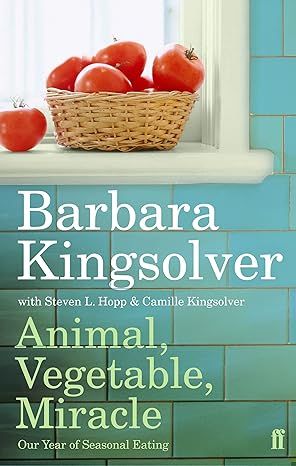
Animal, Vegetable, Miracle: Our Year of Seasonal Eating
4.5
-
2,496
$7.96
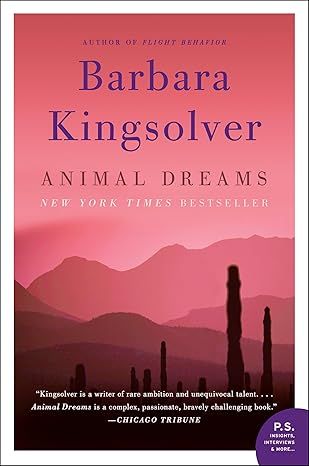
Animal Dreams: A Novel
4.4
-
2,888
$10.49
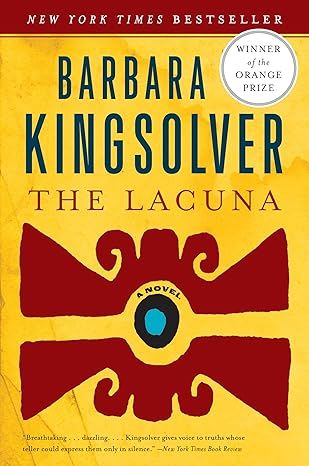
The Lacuna: A Novel (P.S.)
4.4
-
4,450
$1.77
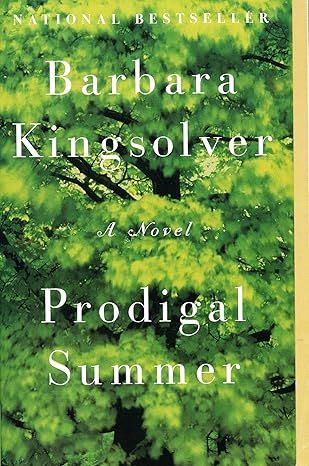
Prodigal Summer: A Novel
4.4
-
6,309
$8.99
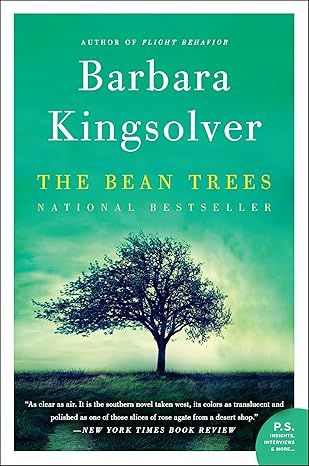
The Bean Trees Anniversary Edition: A Novel
4.4
-
11,504
$2.41
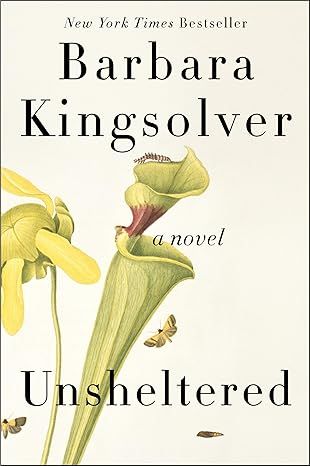
Unsheltered: A Novel
4.2
-
12,750
$5.24
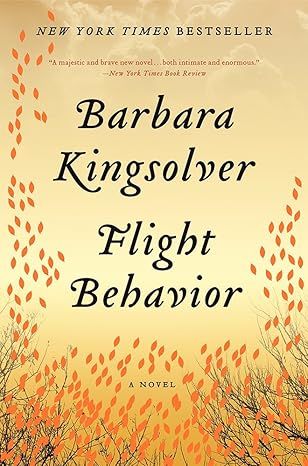
Flight Behavior: A Novel
4.3
-
9,479
$1.84
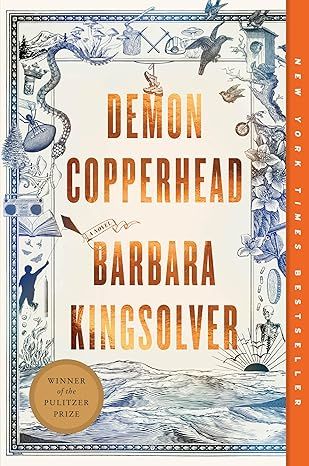
Demon Copperhead: A Novel
4.6
-
110,129
$16.99
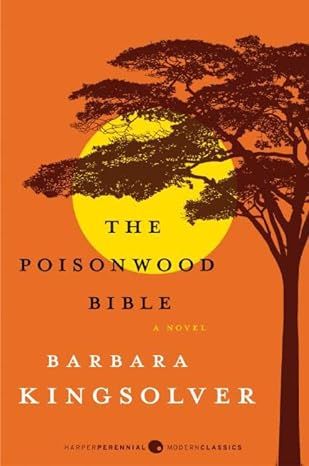
The Poisonwood Bible: A Novel
4.5
-
16,256
$12.69
Similar Books
Best sellers
View all
The Tuscan Child
4.2
-
100,022
$8.39

The Thursday Murder Club: A Novel (A Thursday Murder Club Mystery)
4.3
-
155,575
$6.33

Sapiens: A Brief History of Humankind
4.6
-
140,302
$13.49

The Butterfly Garden (The Collector, 1)
4.3
-
88,556
$9.59

Things We Hide from the Light (Knockemout Series, 2)
4.4
-
94,890
$11.66

The Last Thing He Told Me: A Novel
4.3
-
154,085
$2.99

The Perfect Marriage: A Completely Gripping Psychological Suspense
4.3
-
143,196
$9.47

The Coworker
4.1
-
80,003
$13.48

First Lie Wins: A Novel (Random House Large Print)
4.3
-
54,062
$14.99

Mile High (Windy City Series Book 1)
4.4
-
59,745
$16.19

Layla
4.2
-
107,613
$8.99

The Locked Door
4.4
-
94,673
$8.53
